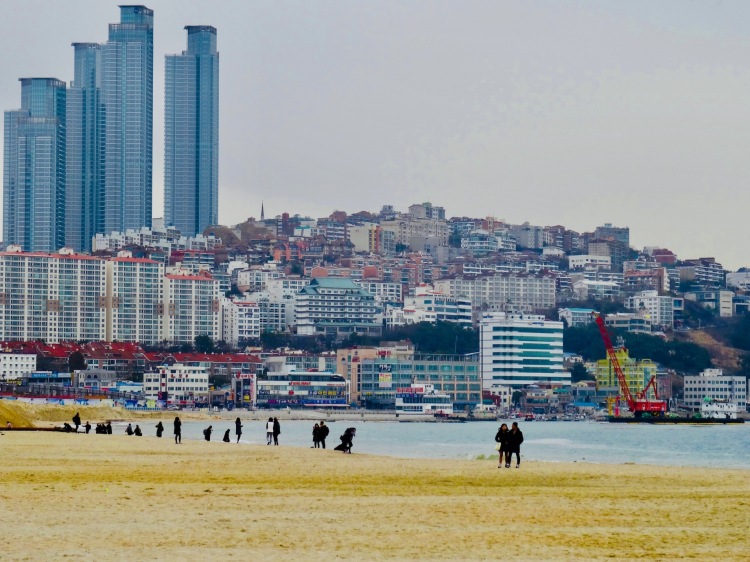The Walkman
from Pukyong to Haeundae Beach
down along the boardwalk in the evening
when dieting ajumas wave their arms
like moving mannequin exercise machines
flaunt their robotic marching moves and
college girls skip and dance, strut
in high heel spiked stilettos
their mini-shorts and knee-length socks
all part of the red-carpet show.
They all want to be narrator models
better yet, talk-show host movie stars
fashion talents in the luxury event.
He catches a film at PIFF Center
free for the taking at Sfunz
sits and reads in the bookstore
drops in to see the Filipina all-girl band
scantily dressed like the Moulin Rouge
scoffs a Herald at the Hotel Westin and
passes the calling cards of the telephone pros
placed conveniently at the doors of yogwans
down the back street alley ways
the service, a nightly entertainment ritual
while the crab lady chats on the wharf
there’s a fight outside of Homer’s
make-up High School smoking girls
sneak behind the neon-lit arcade in
tight blouses and hiked-up skirts
back behind the Viking Ship, the Crazy Flip
sashimi whiffs from soju tents
the smell of Chinese fireworks gun powder
and dead fish along the shore
while lovers pose for digitals
against the backdrop of the bridge
and the raw fish drunks stagger
from norae-bongs, sing off-key
70/80 blasts electric songs
girls all prance and flutter

Busan, on the southern coast of the Republic of Korea, is the country's 2nd largest city and contains the largest port. The city has 6 beaches, but Haeundae is the nation's largest. The Pukyong National University was formed in 1996 from the merger of the National Fisheries University of Busan and the Busan National University of Technology. "The Korea Herald," an English-language daily, was established in Seoul in 1953 as "The Korean Republic" and changed its name in 1973. "Ajumas" are old women, "yogwans" are small private academies, "norae-bongs" (song rooms) are karaoke singing venues. "Soju" is a clear, colorless distilled beverage traditionally made from rice, wheat, or barley, but now often from potatoes, sweet potatoes, or tapioca' it means "burned liquor" (referring to the heat of distillation); it was developed by the Yuan Mongols who invaded the peninsula in the 13th century.
ReplyDeleteActually, "ajumas" are essentially middle-aged (broadly speaking) in that they not maidens or grandmotherly. In Korea they are characterized in lovingly disparaging terms, almost like a separate class.
ReplyDelete